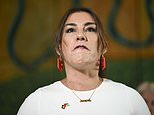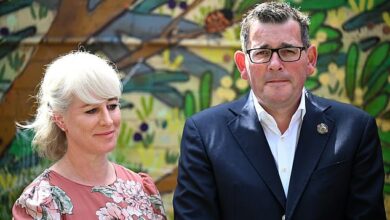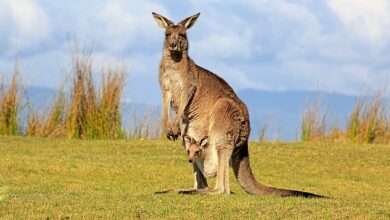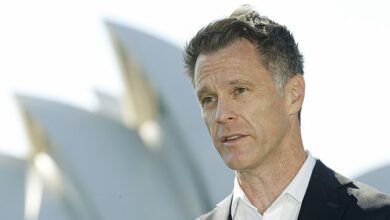Man who settled in Australia as a migrant says he is concerned about a ‘far-left’ shift and increased migration
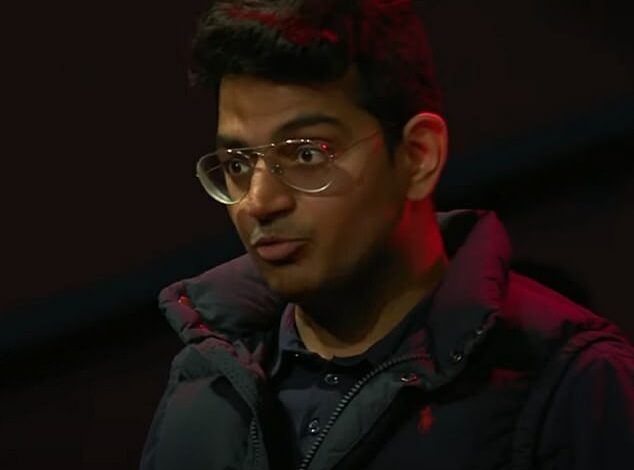
A migrant in Australia has spoken out about how the country is becoming too ‘woke’ by catering to every grievance group, and risks irreversibly changing from the country he was drawn to.
On Monday night, a man who gave his first name as Janik appeared in the audience of the ABC program Q+A. He said he had spent 60 percent of his life in Australia, where he had raised a family, bought a house and worked in engineering.
“I am very concerned about the shift to the extreme left in our country,” he said in the program.
‘Now that public schools are promoting a woke mentality, there is an increase in immigration of all kinds, woke climate policies and prices are skyrocketing.
‘So my question is, how long will it be before Australia becomes unrecognisable from the country that attracted me because of its fairness and opportunity, based on nothing other than its merits?’
Maria Thattil, author and former Miss Universe Australia, responded by arguing that so-called ‘woke’ values were merely an attempt to reverse decades of discrimination.
“We hide behind the word woke, while we stand up for communities that need respect for their human rights, dignity and freedoms,” Thattil said.
She said diversity quotas are justified because marginalized groups face systemic barriers and disadvantages, citing her own experiences as a queer woman of Indian descent.

Appearing to the audience of the ABC’s Q+A on Monday night, Janik said he has spent 60 percent of his life in Australia, raising a family, buying a house and contributing to technological advancements through his work.

In response to Janik’s question, author Maria Thattil said that when ‘woke’ values were discussed, it usually involved advocating for marginalized communities such as the LGBTQI+ community.
“We’re talking about fairness and opportunity. If we really lived in that kind of meritocracy, I think we would have equal representation of women, people of color, queer people, and people with disabilities in positions of power and leadership,” she added.
“We need these progressive movements to help people who started out at a disadvantage and face great inequality.”
Lawyer and panellist Nyadol Nyuon, who came to Australia as a refugee, said that ‘wokeness’, like any other social movement, is not above criticism.
“Merit is an important concept. But it is not without bias,” Ms. Nyuon said.
She said one of the side effects of diversity programs and quotas is that many women and non-white professionals feel like they are getting preferential treatment, even though their positions are fully deserved and justified.
“Despite coming to this country as a refugee, I have been incredibly lucky. I studied law, got a bachelor’s degree, did internships and worked hard,” she said.
“But every time I walk into the room, everyone thinks I’m a diversity thing.”

Lawyer Nyadol Nyuon says she is being treated as if her achievements are lesser because of ‘anti-woke’ attitudes. Photo: ABC
“And that’s destructive too,” she said.
This comes after Gina Rinehart criticised Australia’s ‘woke’ education system, claiming children are being ‘taught to be ashamed of our country’.
The mining magnate said in a video address to the Bush summit in Bendigo, Victoria, last month that “our children and grandchildren are being let down at school”.
‘Even children as young as three years old in kindergarten are told that our police are bad and that plastic, which is indispensable in hospitals, is bad.
‘They and others in school classes are no longer taught to be proud of our country, on the contrary.
“They are taught that it is wrong to say there are two genders, and are even scolded for saying so. They are taught propaganda instead of facts, and wokeness instead of understanding rationality and logic.”
In June, Yarraville West Primary School in Melbourne made headlines after students sang a revised version of ‘Advance Australia Fair’ during assemblies.
Although the other version retains the original 1878 music, the lyrics have been adapted to emphasise Aboriginal history.
The adaptations were created in 2015 by Indigenous artists for the Dulwich Centre and Seekers singer Judith Durham.
Several parents have complained about the change, saying it confuses their children because they don’t know how to sing the official anthem.

